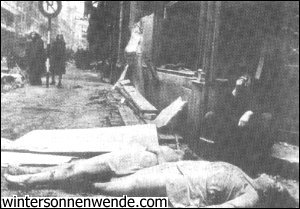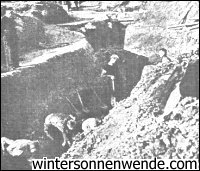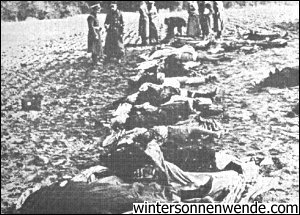 |

Ingomar Pust The Mass Crimes Against the Sudeten
Germans
Took Place in Public Non-Stop Mass Murders  heresia Lindenmeier, Trotzau: heresia Lindenmeier, Trotzau:"Around June 12, 1945, partisans rounded up the entire population of Trotzau. Then the names of five people who were to be shot were read out. One of them was absent because he hadn't yet returned from the Wehrmacht. At that, the leader of the partisans tore up the paper with the names and declared that he would instead choose 20 people from the crowd to be shot. He picked 20 men at random, and these were first beaten bloody by the attending Czech population and then riddled with bullets so that they all collapsed into one heap. A few days earlier the entire Bartl family from Trotzau, five people, had been shot. Their bodies were yanked back out of the coffins that the community had provided, and they were buried beside the cemetery instead, at the edge of a field. "At about the same time, a farmer's family in Krottendorf near Trotzau was shot by partisans - man, wife and their nine-month-old child. In the neighboring village the husband and brother of a peasant woman were shot. The farmer's wife herself had to dig a grave in the vegetable garden and to bury them in it. It was forbidden, on pain of death, to speak of these things. "I can take this testimony on my oath, and bring many witnesses to support it."
"From May 12 to 15, 1945 I was assigned to a burial commando in Wolkowitz. There I saw how thousands of German soldiers as well as civilians - women and men and even young people 10 years and up - were brutally murdered. Mostly they were clubbed to death by Czech Revolutionary Guardsmen. Often the dreadfully battered bodies were rubbed with hydrochloric acid, just to torture them. One Dr. Blume of Berlin was in charge of ascertaining the death of these people. Fingers with rings on them were torn off some people's hands while the people still lived. The dead were buried in a mass grave in Wolkowitz, by the cemetery. "From the work unit in Wolkowitz I was sent to the penal camp Kladno, where I saw inmates being scalded with hot tea on their bare skin, on their back and buttocks, and being beaten terribly afterwards. In the two months I spent there, I myself was beaten daily."
"On May 13, 1945 the Czech reign of terror began in Iglau. About 1,200 Germans committed suicide the following night. By Christmas there were some 2,000 dead. On May 24 and 25 partisans drove the German population out of their homes within twenty minutes and locked them into the camps Helenental and Altenburg. These camps were officially known as concentration camps. Both camps held about 6,700 people. There was not enough water, neither for drinking nor for other purposes. There were no toilet or washing facilities. For the first days there was also no food, and later only a thin watery soup and 3 1/2 ounces of bread daily. After the first eight days children were given a cup of milk. Each day several elderly people and children died. On June 8 the inmates of Helenental were robbed of even their last possessions, and the next day they were marched more than 20 miles via Teltsch to Stangern. On this death march the people were constantly urged to greater speed with whippings. 350 people lost their lives to exhaustion and hunger on this trek." Franz Kaupil continues: "In Stangern 3,500 people were crammed into a camp with an intended capacity of 250. Most of them had to camp outdoors, despite the rain. The next day, families - men, women and children - were quartered separately. The food was unfit for human consumption. In the course of a shooting in the women's camp four women were killed, among them Frau Friedl and Frau Kerpes, and one woman was badly injured. Corporal punishment was the order of the day for men and women alike. There was even a separate cell for beatings. "The camp administration rented the inmates out to the Czech farmers as workers." Franz Kaupil recalls further that on June 10, 1945 16 inmates from Iglau were taken from their cells and shot in the Ranzenwald forest. "Among them was the old town priest Honsik, the gentlemen Howorka, Augustin, Biskons, Brunner, Laschka, Martel, Kästler, and others whom I did not know. As late as May 1945, Krautschneider, Kaliwoda, Müller and Ruffa were shot in the court hall without any trial at all. One Hoffmann was beaten to death. Rychetzky was the warder whom everyone feared most. Factory owner Krebs was scalped. Building contractor Lang died of the effects of horrible maltreatment. 70-year-old Colonel Zobel hung himself in the cell. "Many people had been forced with brutal abuse to give incriminating statements, and were now held for crimes they had never committed at all. "I can take this statement on my oath, and can also produce further witnesses to these events."
 xcerpt from the book Zwiespalt der Gemüter by
Alexander
Hoyer: xcerpt from the book Zwiespalt der Gemüter by
Alexander
Hoyer:"In the night of May 4-5, 1945 the mass murders began in Prague. The most gruesome events of the Middle Ages pale in comparison to the murderous blood lust that played itself out in the streets, houses and most of all the hospitals of Prague.
After the all-out war effort had been proclaimed in 1944, medical student Ingrid Langer had signed up as Red Cross nurse. She was stationed in the Luftwaffe hospital on the right bank of the Moldau River in Prague. In the morning of May 6 a sizeable group of young Czech men and girls arrived howling and yelling at the main entrance of the hospital and, threatening with submachine guns, demanded that all Red Cross nurses, as well as all the wounded who could walk, should come out. When the doctors tried to dissuade the mob from their demands, and pointed out the regulations of the Red Cross, under whose protection the hospital was, the riotous mob roared with laughter. The armed ringleaders stormed into the hospital rooms and drove the wounded in their striped pajamas out before them. Other heroes of this kind brought out all the nurses on duty, lined them up and selected the ten youngest and prettiest of them. Ingrid Langer was among them. After lengthy arguments among the teenaged hoodlums as to what sorts of abuse they would engage in, they agreed to march their victims into town. Along with a selected 10 wounded patients, the nurses had to line up in rows of two and march off, singing the German national anthem. Anyone who did not sing loudly enough, or at all, was beaten until his or her voice was audible. To either side of the street the compatriots of the wild mob stood applauding. The procession was stopped in Peter's Square, which seemed to be the arena best suited for the planned macabre game. A bow-legged descendant of the Awars shrieked: "Undress! Everyone undress completely!" Since the unfortunate victims made no move to take off their clothes, he gave his accomplices the sign to start beating. The wounded and the nurses were smashed to the pavement, some beside and on top of each other, unable even to move. "Undress or die!" the sadist kept screaming. The wounded soldiers soon took off their hospital pajamas. Stark naked, they were at the mercy of the goggling crowd. The nurses as yet retained their underwear. No-one minded that their undressing took a little longer, for the surrounding crowd relished the sight of these half-naked German Red Cross nurses. But then the ringleader demanded that the stripping be completed. "Undress! Finish undressing!" he roared again, "strip to the skin, you swine!" At last, when all ten finally stood stark naked in the middle of the square, hiding their faces in their hands, the Prague citizens' merriment rose to a fever pitch. But Ingrid Langer, who had grown up in Prague, knew her Czech fellow citizens only too well. She knew that the final act of the drama staged here would be a deliberately drawn-out but all the more gruesome death. Like lightning she made a break for it, darted through a weak point in their encirclement, and dashed off towards the lower end of the square. Before the baffled bystanders realized it, she had escaped the arena of death. But at the square's end Ingrid Langer ran right into the hands of her next tormentors! A band of plunderers, heavily laden with rugs, paintings, furs, tableware and more, caught the naked fleeing girl in a flash. They dragged her into the house they had just left, up to the first floor, into the home they had plundered. In the hallway on the floor lay a dead woman about 25 years old. Next to her huddled a child of perhaps two, blood-bespattered and sobbing bitterly. The captured naked beauty was shoved into a bedroom to a host of obscene comments. At the sight of the pretty young girl all the plunderers had turned back, in the certain expectation of a good time. There was not one among them that did not participate in the ensuing rape. More Czechs who came running in continued their predecessors' disgraceful deed. At last the victim mercifully lost consciousness. Meanwhile, the macabre spectacle in Peter's Square had continued. The nine yet surviving Red Cross nurses had been lined up opposite the injured men, naked as they were, and the nurses were ordered to tear the men's private parts off. An unbelievably brutish idea. The victims themselves could hardly believe the perverted orders. "Rip it off! Rip it off!" And right away the entire crowd joined in, roaring and chanting and clapping their hands in rhythm. None of the German girls could be forced to even try to carry out the bestial order. They ignored the ever more threatening demands of the crowd, which was literally going wild. Not one made any move to comply, even after most of them had already collapsed, unconscious, under the blows from the rifle butts. Never before in history had the world seen human cruelty to equal what happened here!
The Death March of
Brünn
"Beat them, beat them, leave none alive!"  an Zizka's Hussite War battle cry of the early 15th century, "Beat them,
beat them, leave none alive!", was echoed and turned into infernal, gruesome reality by
that late-medieval Czech knight's descendants in the death march of Brünn on Corpus
Christi 1945. an Zizka's Hussite War battle cry of the early 15th century, "Beat them,
beat them, leave none alive!", was echoed and turned into infernal, gruesome reality by
that late-medieval Czech knight's descendants in the death march of Brünn on Corpus
Christi 1945.Just as in those early days, the masses, inflamed by their leadership, abandoned themselves publicly and without shame or conscience to a degree of brutality and bestiality that few outsiders could have conceived of.
Frau Theresia Beichl, who was on this death march with her little daughter, recounts the following: "I saw a woman giving birth in a ditch. Afterwards the Czechs beat her to death and trampled the newborn until it was dead too." That such incredible brutishness was not an isolated case is shown by the account of Frau M.v.W. (Documents on the Expulsion of the Sudeten Germans, op.cit.), who recounts being ordered (with reference to a dead mother and child) to "throw the sow into the latrine together with her bastard!" When M.v.W., a Red Cross nurse, refused, two other women were forced to perform the abominable deed and to throw the dead mother and baby into the open latrine. Weeks later it was still possible to see the baby's head and one of the mother's arms sticking out of the filth. The murders and brutality that accompanied this forced march to Austria are uncounted. In Pohrlitz, one of the largest of all mass graves remains as silent witness to this death march, and there is hardly a town or village all the way to the border where some dead were not buried, thrown like dogs into shallow graves. It was a 60-km crusade of Germans forcibly expelled from Brünn and tortured to the point of death.
|











